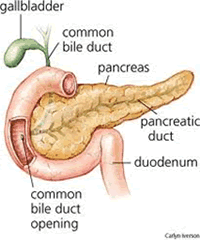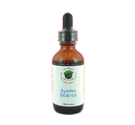|
|
Pancreas Support Remedy
 |
The pancreas is a large, carrot shaped gland. The larger end of the pancreas is called the head and is tucked into the gut just below your stomach. The tail end is on your left side and touches your spleen. The head is attached to the first section of the small intestine (duodenum) by the common bile duct. You can see in the photo that the gallbladder and the pancreas both share and empty their secretions into the small intestine through the common bile duct. The pancreas is technically considered an endocrine gland (refers to cells that secrete hormones), but it has digestive functions, making it an organ, or exocrine.
The part of the pancreas with endocrine function is made up of approximately a million cell clusters called islets of Langerhans, which play an imperative role in glucose (sugar) metabolism and regulation of blood glucose concentration. Within the Islets are four other types of cells that secrete glucagon, insulin, somatostatin and pancreatic polypeptide.
In contrast to the endocrine pancreas, which secretes hormones into the blood, the exocrine pancreas produces digestive enzymes and an alkaline fluid (referred to as pancreatic juice). It secretes them into the small intestine through a system of exocrine ducts in response to the small intestine hormones, secretin and cholecystokinin. Digestive enzymes include: trypsin, chymotrypsin, pancreatic lipase, and pancreatic amylase. They are produced and secreted by acinar cells of the exocrine pancreas. Specific cells that line the pancreatic ducts, called centroacinar cells, secrete a bicarbonate- and salt-rich solution into the small intestine.
When you eat, the body converts food to blood sugar (glucose). When the body gets sugar, the pancreas makes insulin which is used to take the sugar from the blood stream and store it in the liver or carry the sugar into your cells where it is burned for energy. It's a beautiful system. In humans, the secretory activity of the pancreas is regulated directly via the effect of hormones in the blood on the islets of Langerhans and indirectly through the effect of the autonomic nervous system in the blood flow.
Fun Facts
- All enzymes die if you cook food to only 150 degrees.
- The pancreas was designed to be the back-up for enzyme release, the primary source being from fresh, raw foods. When you don't eat raw foods, the pancreas is continually over worked and eventually will not function properly. Ok, that wasn't a fun fact.
Health Conditions
- Injury - Because the pancreas is a storage depot for digestive enzymes, injury to the pancreas is potentially very dangerous. A puncture of the pancreas generally requires prompt and experienced medical intervention.
- Pancreatitis is inflammation of the pancreas. Gallstones and alcohol are the two most common causes for pancreatitis. A variety of factors cause a high pressure within pancreatic ducts. Pancreatic duct rupture and pancreatic juice leakage cause a pancreatic self-digestion.
- Pancreatic cancers, particularly cancer of the exocrine pancreas, remain one of the most deadly cancers, and the mortality rate is very high.
- Diabetes mellitus type 1 is a chronic autoimmune disorder in which the immune system attacks the insulin-secreting cells in the pancreas. Secondary diabetes is a special type, which can be caused by many factors.
Suggestions To Strengthen
- Decrease intake of refined carbohydrates (sugar), increase complex carbs and fiber.
- If you are going to eat sweets, eat them right before you eat some protein (except dairy) to help balance metabolism.
- Consume a balanced diet of good fats (raw nuts and seeds, clean "kosher-type" fish for meat choices).
- Eat lots of fresh, raw vegetables and fruits, organic if possible.
- Stop the stimulants - coffee, caffeine, etc.
- Eat regularly to keep your blood sugar stable.
- Indulge in the sweetness of life. The pancreas needs laughter, experience the things that bring happiness, good memories and dreams.
|
|
| |
Pancreas Support Remedy
Complete support remedy for Pancreas and related functions
$14.95
|
 Add
To Cart Add
To Cart |
 |
 |
Gallbladder Support Remedy
Complete support remedy for Gallbladder and related functions
$14.95
|
 Add
To Cart Add
To Cart |
 |
 |
Brain Support Remedy
Complete support remedy for Brain and related functions
$14.95
|
 Add
To Cart Add
To Cart |
 |
 |
Large Intestine Support Remedy
Provides support and healing for conditions of the large intestine
$14.95
Read/Write Reviews
|
 Add
To Cart Add
To Cart |
 |
 |
|
|



